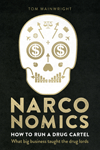Are drug dealers different from other business owners?
Book review: Narconomics: How to Run a Drug CartelNarconomics by Tom Wainwright is a pithy and engaging argument on drug law reform.

Get the latest financial news, insights and expert analysis from our award-winning MoneyWeek team, to help you understand what really matters when it comes to your finances.
You are now subscribed
Your newsletter sign-up was successful
Want to add more newsletters?

by TomWainwright
It is sometimesargued that drugdealers are nodifferent fromother businessowners, with thesole differencebeing that theirproduct happensto be illegal. Is thattrue? It's the premise of Narconomics:How to Run a Drug Cartel, by TomWainwright. Wainwright useseconomics to analyse this multibillion-dollar industry and finds thatthere are indeed many similaritiesbetween the cartel kingpins and theaverage multinational.
Despite some grim subject matter,the book is "great fun", says JohnArlidge in The Sunday Times.Indeed, "there are so many well reportedexamples of the smarts ofthe cartels" that "you end up withsneaking respect for some of themost heinous entrepreneurs in theworld". Wainwright does make a"half-hearted" effort to outline someanti-cartel strategies, but the keymessage is that "it will be hard" to getthe estimated 250 million drug users to"kick a habit that they clearly enjoy" his preferred option is legalisation.
Try 6 free issues of MoneyWeek today
Get unparalleled financial insight, analysis and expert opinion you can profit from.

Sign up to Money Morning
Don't miss the latest investment and personal finances news, market analysis, plus money-saving tips with our free twice-daily newsletter
Don't miss the latest investment and personal finances news, market analysis, plus money-saving tips with our free twice-daily newsletter
The book is "lively and engaging" and"informed by both dogged reportingand gleanings from academicresearch", agrees David Wessel ofThe Wall Street Journal. Yet it failsto provide "a convincing argumentthat the US could safely legalise andregulate addictive drugs and thatdoing so would reduce the number ofusers". Wainwright himself describes"how many Americans were legallyprescribed the painkiller OxyContinby regulated physicians and becamehooked, with devastating results".
On the contrary, "by looking at thedrug trade as a business, Wainwrightis able to reveal much about why itwreaks such havoc in Central andSouth America," says Misha Glennyin The New York Times. "The violenceit leaves in its wake... is not a randomby-product of gangster culture" thevery illegality of the business meansviolence becomes "the only way toenforce contractual agreements".This book "is one of the pithiest andmost persuasive arguments for drug law reform I have ever read".
Narcoeconomics: How to Run aDrug Cartel, by Tom Wainwright.Ebury Press (£20).
Get the latest financial news, insights and expert analysis from our award-winning MoneyWeek team, to help you understand what really matters when it comes to your finances.

-
 Do you face ‘double whammy’ inheritance tax blow? How to lessen the impact
Do you face ‘double whammy’ inheritance tax blow? How to lessen the impactFrozen tax thresholds and pensions falling within the scope of inheritance tax will drag thousands more estates into losing their residence nil-rate band, analysis suggests
-
 Has the market misjudged Relx?
Has the market misjudged Relx?Relx shares fell on fears that AI was about to eat its lunch, but the firm remains well placed to thrive